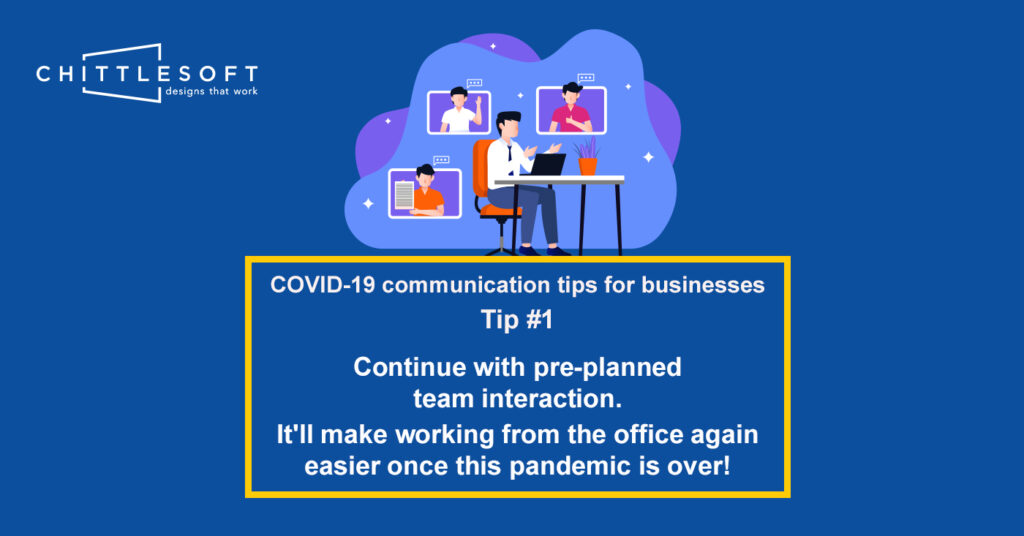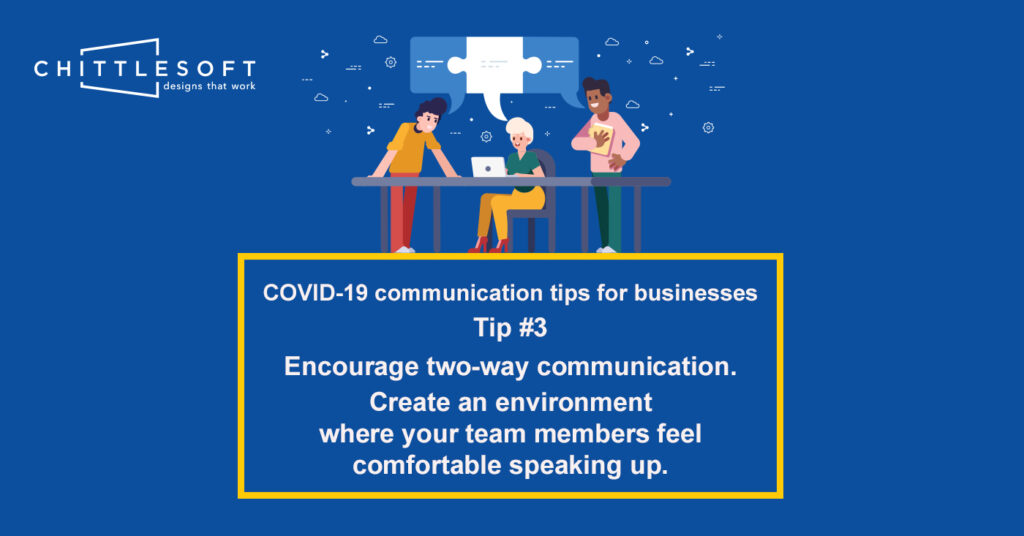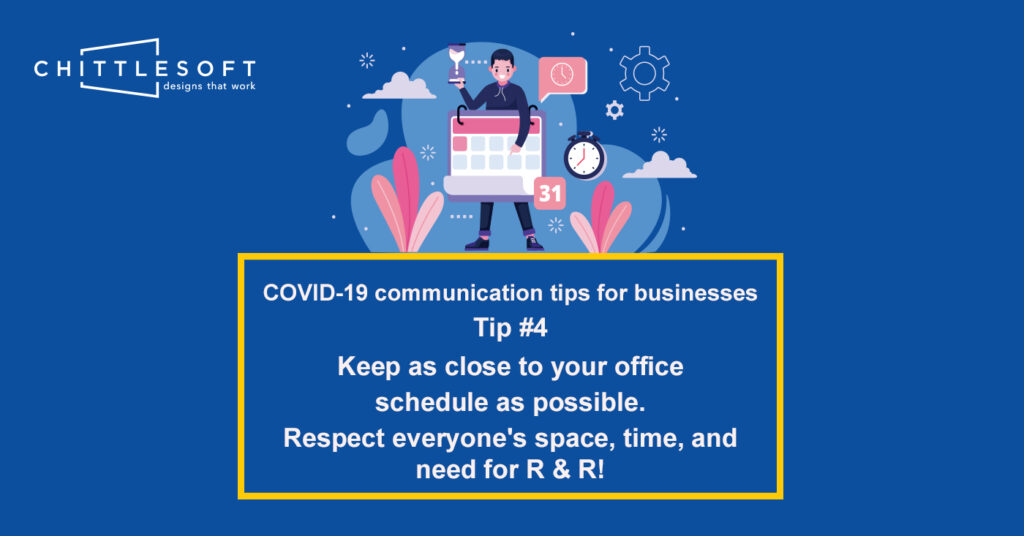
When the COVID-19 pandemic hit, people across the world made the switch to remote work. For some, this was temporary. For others, it may be permanent. Either way, one thing is clear: remote work is here to stay.
One of the first major challenges many of us faced was how to work from home productively, without the physical separation of home and work. Employees faced the demands of running a household and caring for family members, as well as obstacles at work—including technical issues and stressed-out teams and clients.
At Chittlesoft, we encountered many of these challenges, too. Most of them came down to communication, i.e., how to communicate effectively at work. To help us handle it better and stay productive and efficient, we turned to in-house communication experts such as Denise Chakranarayan, our communications expert and Director – Learning Solutions.
Denise put together a few tips for effective communication to help us handle the challenges of working remotely better, which we continue to follow for all our remote interactions. Over the last 14 years, her expertise has helped us and our clients improve communication for better outcomes.
Looking for fresh content that engages your team and target audience? Start here.
At the start of the pandemic, Denise observed that “the COVID-19 pandemic is testing everyone’s communication skills. Companies must adapt quickly to ensure they’re saying the right things to their customers and employees.”
To help us work better as a team and continue providing our clients with high-quality sales enablement and marketing collateral services effectively, Denise made the recommendations below. They’ve helped us immensely, so we thought we’d share them with you. Try these tips for effective communication to improve your team’s work-from-home experience!
Tips for effective communication: What working remotely through the COVID-19 pandemic taught us
Tip #1: Continue with pre-planned team interaction

In an office, regular team communication and interaction typically follows a kind of rhythm or schedule. In addition to speaking with individual team members, there are specific meetings for status updates, feedback, and planning, for example.
These interactions often go beyond the functional and offer opportunities to brainstorm, exchange ideas, and get inputs from several team members. They also strengthen work relationships.
Because they offer many benefits, it’s a good idea to continue with these interactions via a virtual platform while working remotely. This tip for effective communication will help you avoid a break in rhythm and keep things moving smoothly. This makes it easier to move seamlessly between working remotely and working from the office as needed.
While interacting with your team virtually, consider communication redundancy. This is where you convey the same piece of information via more than one channel, in case the primary channel doesn’t work.
For example, a video call can be followed up by an email recapping the key points, to help fill any communication gaps from the call. Such repetition/duplication could help avoid communication gaps, misunderstandings, and frustrations.
Tip #2: Touch base with your customers

In addition to changing work processes, many of us are still coming to terms with the long-term economic effects of the pandemic on our businesses. Like you, your customers are trying to cope with this and would appreciate some empathy.
One tip for effective communication is to touch base with them; send them a message or email inquiring about their well-being.
Check in with them regularly to ask if there is anything you can do to make their life and work easier. Let them know they are more than ‘just another customer’ to you.
Tip #3: Encourage two-way communication with your employees

While working remotely, communication can become one-sided. Team leaders and senior managers give instructions, ask for status updates, and provide feedback that’s usually constructive and doesn’t require much back-and-forth.
This doesn’t give team members a chance to participate and contribute. It’s essential, therefore, for companies to actively engage them.
Keeping that in mind, here’s another tip for effective communication: Create an environment where your team members feel comfortable commenting, discussing, giving their opinions, or talking about challenges they may be facing.
Encourage two-way conversations. You could do this by planning meetings such that each team member gets an opportunity to speak.
The key is to go beyond functional discussions and invite new points of view that will help your organization continue to grow and innovate.
Tip #4: Keep as close to your office schedule as possible

When thinking about how to make communication better, it’s also important to think about when you are communicating with your team. That’s why one of our tips for effective communication is to communicate within office hours.
Working remotely? Keep this in mind to stay productive.
Not being able to clock in and out physically blurs the lines between work time and personal time. It’s crucial for your well-being that you try to stick to your office schedule as far as possible.
Avoid working late, sending messages late at night, or expecting your employees to work late just because they are at home with a laptop nearby. Also, keep in mind that people are dealing with new pressures at home and probably have plenty to do after work. They’re also under a lot of stress and need the downtime to maintain productivity levels without burning out.
According to Harvard Business Review, employee burnout is what employers need to worry about more than maintaining employee productivity. Respect everyone’s space, time, and need for R & R!
Tip #5: Stay calm, be patient, and show understanding

Working from home is not the dream we all thought it was. Distractions, interrupted power supply, poor network coverage, and the stress of staying indoors could lead to missed deadlines, frustration, and frayed tempers.
Everyone is dealing with their own challenges. Stay calm, be patient, and show understanding—everyone losing their cool is not going to help you, your team, or your customers. Instead, try these tips for managing frustrations at work:
- Take a step back to assess
What is the reason behind your frustration? Writing it down can help you evaluate how serious it really is and find a solution.
- Look for the silver lining
Is there a positive outcome to look forward to? Perhaps this situation will shine a light on a deeper issue that needs attention. If someone—an employee or customer—is being difficult, you could view it as an opportunity to help them find a solution. This can strengthen relationships in the long run.
- Think back to a time when you were this frustrated
Now think of how things were resolved in that situation. Recognizing that your current frustrations are likely to pass the same way can be calming and can help you find a solution faster.
To help foster effective communication in the workplace, it’s important to be empathetic, considerate, and proactive in your interactions with everyone you are dealing with.
The pandemic has required us all to be flexible when it comes to how and where we work. Some of us are back in the office full time, while others follow a hybrid model, moving between working from home and the office.
What makes these frequent transitions smoother is prioritizing communication. We hope these tips for effective communication will help you and your team stay efficient and in sync, no matter where you’re working from today!
For your sales and marketing teams, another way to boost efficiency and effectiveness is with strategic, engaging content and design. To provide your teams with high-ROI sales and marketing collateral, contact us today.








